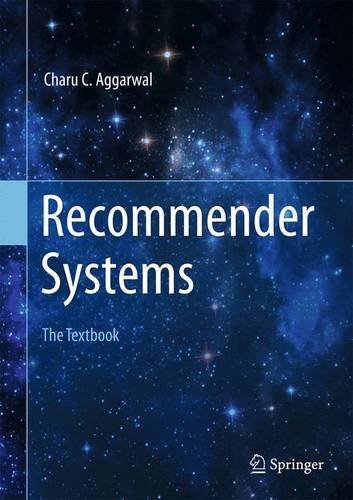Recommender Systems: New Comprehensive Textbook by Charu Aggarwal
Covers recommender systems comprehensively, both fundamentals and advanced topics, organized into: Algorithms and evaluation, recommendations in specific domains and contexts, and advanced topics and applications.
Recommender Systems: The Textbook, Springer, April 2016
Charu C. Aggarwal

- Comprehensive textbook on recommender systems: Table of Contents
- PDF Download Link (Free for computers connected to subscribing institutions only)
- Buy hard-cover or PDF (for general public)
- Buy low-cost paperback edition (Instructions for computers connected to subscribing institutions only)
This book covers the topic of recommender systems comprehensively, starting with the fundamentals and then exploring the advanced topics. The chapters of this book can be organized into three categories:
Algorithms and evaluation: These chapters discuss the fundamental algorithms in recommender systems, including collaborative filtering methods, content-based methods, knowledge-based methods, ensemble-based methods, and evaluation.
Recommendations in specific domains and contexts: The context of a recommendation can be viewed as important side information that affects the recommendation goals. Different types of context such as temporal data, spatial data, social data, tagging data, and trustworthiness are explored.
Advanced topics and applications: Various robustness aspects of recommender systems, such as shilling systems, attack models, and their defenses are discussed. In addition, recent topics, such as multi-armed bandits, learning to rank, group systems, multi-criteria systems, and active learning systems, are discussed together with applications.
Although this book is primarily written as a textbook, it is recognized that a large portion of the audience will comprise industrial practitioners and researchers. Therefore, the book is also designed to be useful from an applied and reference point of view. Numerous examples and exercises have been provided.
Cost-effective methods for obtaining electronic and hardcopy versions
The book is available in both hardcopy (hardcover) and electronic versions. The hardcover is available at all the usual channels (e.g, Amazon, Barnes and Noble etc.), in Kindle format, and also directly from Springer in hardcopy and pdf format. The good thing about Springer is that electronic versions are often widely accessible at no cost to subscribing institutions, which is particularly convenient for students. My understanding is that a very large fraction of universities in North America, Europe, Australia, and New Zealand are subscribers, and a rapidly increasing number of universities in Asia are also subscribing. The electronic version is available at the following Springer link pointer.
For subscribing institutions click from a computer directly connected to your institution network to download the book for free. Springer uses the domain name of your computer to regulate access. To be eligible, your institution must subscribe to "e-book package English (Computer Science)" or "e-book package English (full collection)". If your institution is eligible, you will see a (free) 'Download Book' button. Otherwise you will see a (paid) 'Get Access' button. Sometimes you may be able to download it from your library e-collection, even when it is not Web-accessible from your institution. If you have ever published an article (even journal) with Springer, you are also entitled to an additional 40% author discount for any Springer book using the approach described here.
Related:
